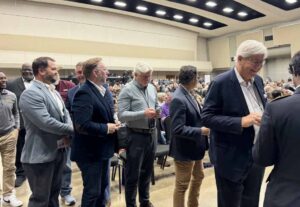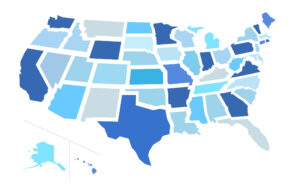
MIDDLE BELT, Nigeria (BP) — The mass slaughter of Christians in Nigeria is calculated genocide abetted by the government in the nation that is Africa’s most Christian, cries a growing number of leaders calling on the United States to intervene.
Evangelical John Stonestreet, president of the Colson Center for Christian Worldview, is among the latest to describe as genocide the killing of some 6,000 Christians this year alone in Nigeria by jihadist Fulani herdsmen aided by resurging Boko Haram terrorists.
“This is genocide,” Stonestreet has said. “And the government … there is abetting it. It is dismissing it as a land dispute.”
Stonestreet joins a growing list of Christian, political and social activists proclaiming the deaths genocide, pogrom or ethno-religious cleansing, including the Christian Association of Nigeria (CAN), the Jubilee Campaign for Religious Freedom, Christian Solidarity Worldwide (CSW), International Christian Concern (ICC) and the Lift Up Now grassroots foundation led by Southern Baptist Nigeria native Adeniyi Ojutiku.
The killings are not a matter of a traditional land dispute that has separated Christians and nomadic Fulani Muslim herders for ages, according to Ojutiku, CAN, Stonestreet and others. Instead, the government and herdsmen have used the historical land dispute as an excuse, denying that a jihad is in progress.
“There is no doubt that Christians are the main target of the incessant human carnage being perpetrated by (Nigerian President Muhammadu) Buhari’s Fulani kinsmen,” Ojutiku told Baptist Press Aug. 1, noting Buhari’s Fulani heritage. “What is happening is that the Islamist Jihadists have advanced a strong but false narrative to obscure the truth.”
Christian activists charge Buhari with complicity in killings concentrated in the nation’s Middle Belt where the majority Muslim north and the majority Christian south and east overlap with diversity.
According to figures from CSW and CAN, the Fulani jihadists have destroyed more than 500 churches in the Middle Belt’s Benue State alone since 2011, and internally displaced about 800,000 people in the state, with 180,000 of them living in camps and others living with relatives or as squatters.
In the most recent mass attack, Fulani killed by some estimates more than 200 Christians as they left the July funeral of a pastor’s relative in the Middle Belt’s Plateau State. Thousands were displaced over two days of attacks in 15 communities, according to press reports.
Fulani herdsmen and Boko Haram gunmen “are prowling villages, shooting and killing innocent Christians,” CAN said as early as January.
CAN “has reviewed the catalogue of horrendous and inhuman attacks on several states and mostly Benue State from 2013 — 2018,” CAN said Jan. 16. “The impression has now been firmly established that the Islamists of northern Nigeria have ‘legalized jihad’ in Nigeria.”
In the highest death tolls, International Christian Concern (ICC) accused Fulani militants and Boko Haram of killing 50,000 to 70,000 Christians in the last 20 years. In its 2018 special report on Nigeria, the ICC termed Nigeria the biggest killing ground for Christians today. Other tallies blame the groups for about 30,000 deaths.
Some contend the U.S. government should use diplomatic force to pressure Buhari to end the systematic slaughter. Ojutiku also called for Buhari’s forced resignation.
U.S. protest and advocacy
Ojutiku, based in Raleigh, N.C., and serving as the U.S. diaspora consultant to CAN, plans to help draw attention to Nigeria’s bloodshed, and the issues driving it, in a press rally from 10 a.m.–2 p.m. Aug. 7 in front of the North Carolina State Capitol Building. Lift Up Now, Ojutiku’s organization working to improve living conditions in his homeland, will be joined by joint rally organizers the Frederick Douglas Foundation of North Carolina and the Douglas Leadership Institute Inc.
Also participating in the rally is the Office of Diaspora Engagement of the Nigeria Working Group, a loose coalition of nongovernmental organizations in the U.S. and Nigeria that Ojutiku helped organize with representatives of CAN, CSW, the 21st Century Wilberforce Initiative and other organizations. Former U.S. Rep. Frank Wolf of Virginia is listed in organizational papers as a consultant.
Ojutiku termed the ongoing killings “an unfortunate pogrom” and “ethnic cleansing” when he spoke at the Global Coalition Working to Defeat Persecution and Violence in Nigeria, a multination summit hosted by the Baptist World Alliance at its Falls Church, Va. office in February.
Buhari has failed to charge perpetrators with a crime, has dismissed evidence that the herdsmen are armed with sophisticated weapons such as AK-47s and chemicals, and has deceptively abetted the killing, many activists say.
CAN has called on Buhari to prosecute for genocide the Miyetti Allah Cattle Breeders Association (MACBAN), a group supporting the herdsmen.
“The Miyetti Allah organization should be tagged a terrorist organization,” CAN said in an official resolution Jan. 16. “Its leaders should be arrested and prosecuted for the genocide against the Christian minorities in the Middle Belt.”
Buhari has it within his power to stop the killings, Ojutiku told BP, and “is by implication complicit in the wanton killings.
“Despite several thousand people killed from last December to date, only a handful of people have been arrested for the crime,” Ojutiku said. “Even then, the chief inspector of police who masterminded the arrest of some culprits in the most recent killing in Plateau State was immediately forced out of office by the government.”
In addition to Buhari’s forced resignation, Ojutiku suggests the U.S. government conduct a hearing on Nigerian atrocities with testimonies from Sam Brownback, U.S. ambassador-at-large for international religious freedom, and others concerned. The escalating violence increases the need for a US special envoy to Nigeria and the Lake Chad Area, Ojutiku said, as others have encouraged, including the Global Coalition Working to Defeat Persecution and Violence in Nigeria.
Buhari has denied charges of abetting the killings, and has largely ignored assertions of genocide. In an April meeting at the White House, President Trump encouraged Buhari to enact widespread, peaceful solutions to the violence and to protect all people, regardless of ethnicity or religion.














